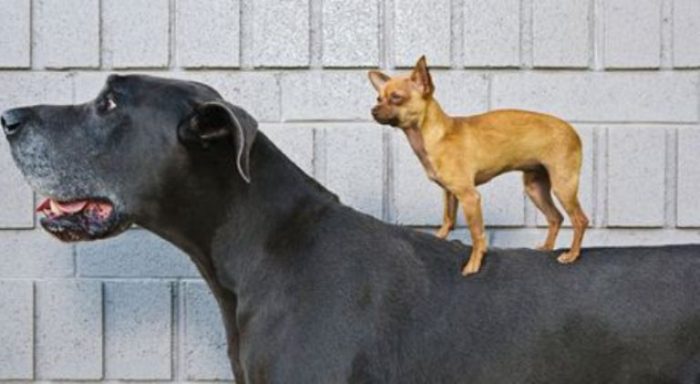Small dog syndrome is the nightmare that might hunt you if you own one of those breeds that stay small forever. Pet parents who just acquired a large breed puppy would naturally want to put the young pup into training with immediate effect; this is because of the common fear that they may not be able to handle the pet when it becomes a large adult. However, the story is always different when they hand over that cute small breed puppy to you.
Adopters tend to think that since the pup will never grow big, they can always handle it, and thus, they will never think of enrolling the cutie for professional training. These pet parents should be aware of the fact that small dog syndrome is real; if you fail to give your small dog breed the necessary training, you will have to contend with excessive disobedience in the future. For this piece, we will examine the real meaning of small dog syndrome, including the causes, symptoms, and more.
Table of Contents
What Exactly Is Small Dog Syndrome?
Small dog syndrome has a simple explanation; it is what occurs when a small dog breed decides that it ought to be the recognized pack leader in a household. This small-sized dog will quickly assume the lead role which may lead to bad dog behaviors like turning a deaf ear to commands, jumping on visitors, jumping on the parents, barking non-stop, chewing away on furniture and objects, as well as any other unpalatable behavior the cutie feels it can get away with. This is the origin of the small dog syndrome – and it gets even more complicated when the dog believes that it can be forgiven for a lot of things.
Over ninety percent of parents of small dogs are guilty of reinforcing these unpalatable behaviors from their pooch; this is unknowingly done through over-protectiveness. Many adopters find it difficult to treat every pup equally, irrespective of size. It is easy to pick up and cuddle a small-sized pup, as it is your ideal lap dog that can comfortably snuggle up to you in bed or on the couch.
Because of this privilege, the small dog may begin to feel that it is actually the one in control. Besides, owners will not help matters when they validate the bad dog behaviors by giving it the leeway to act in manners that huge breeds are not allowed to act. Moreover, these little breeds tend to compensate for their lack of size by acting tough and big when they are faced with intimidation, or when they are disturbed, anxious or frightened.
What Are the Causes Of Small Dog Syndrome?

A lot of factors are responsible for small dog syndrome and most of them are related to fear. When a small dog is scared, it is likely to turn aggressive as it sees itself at a loss on how to handle the situation. There may be things that you are doing as a pet parent that may be building up fear in your cutie. Below are some ways we might be engendering small dog syndrome;
Carrying Your furbaby too often
Though the dog will remain the size of a baby, we should try not to treat it as such. Picking up your furry friend when you are out on walks will put the dog in a helpless position so that it will never master how to tackle situations when left on its own. Once a dog is afraid of the unknown, it will naturally turn aggressive by default which is a symptom of small dog syndrome.
Your pup is allowed to act as the pack leader (alpha)
Though this behavior can be corrected, we shouldn’t allow it to happen in the first place. Small dog syndrome can be reinforced when you always listen to your pooch if it wants something. When your canine friend barks to show that it wants something and you respond immediately, it will believe that you will always give it a positive response when you see it barking. By always getting you to submit, the dog will assume the role of the pack leader and repeat unpalatable behavior because it has concluded that this is how things work.
Your pooch is compensating for a lack of physical size
Nobody has the power to control the size in this case, if your dog belongs to a small dog breed, then it will naturally remain small. Because they are smaller than everyone in the household, both humans and other household pets, your cutie will believe that it needs to act tough in order to survive.
There is a similar syndrome in humans called Small Man Syndrome or Napoleon Complex. This behavior in people originated from Napoleon Bonapatra – the short but aggressive French leader who dominated so many battles.
Symptoms Of Small Dog Syndrome
These are symptoms to watch out for in canines with small dog syndrome.
1. Your dog becomes troublesome
Your pooch will become too demanding and turn troublesome; this will surely affect your daily business as you will have no choice but to go the extra mile to accommodate the troublesome dog.
2. Increased demand for attention
Your dog lets you know whatever it needs by nipping, barking, and growling until you get whatever it is resolved. If you are observant, you will realize that you are no longer the master but the servant. If you are encouraging this behavior, you will soon be faced with small dog syndrome.
3. Your dog cannot relate with other household pets
When you always pick up your small dog and don’t allow it to encounter other pets in the house or neighborhood, it is not likely to get along with them and can never respect them. A dog that is constantly aggressive when faced with other animals is exhibiting signs of small dog syndrome.
4. Your dog is frequently disobedient
Disobedience is another symptom of small dog syndrome. When your dog does not perceive you as the pack leader, it is not likely to listen to your command. However, this can be remedied.
Remedy For Small Dog Syndrome
According to expert reports, there are a handful of remedies for small dog syndrome;
1. Never pick the dog up for this reason
Picking up a pup that is fiercely barking at a fellow household pet may be perceived as a reward by your pooch; this will make it believe that barking is, in fact, very good behavior. Don’t ever scoop up your pooch; allow it to handle situations on its own.
Resist scooping your furry companion up when it is facing a frightening situation. However, you can be close by to give it assurance. If the dog decides to move forward and face the situation, reward it with praises and treats, but if it shows signs of wanting to be picked up by jumping up, try correcting the dog by calmly placing it back on the ground and proceed on the walk. Remember to reward the dog when it responds positively.
2. Train the dog to walk with a leash
Another remedy for small dog syndrome is allowing your pooch to walk on a leash which equips the canine with more confidence; this is something every adopter needs to develop. The leash also helps you to promptly correct any bad behavior with a slight tug. This is very important when you go out for walks, especially to the park where other dogs might be encountered.
3. Let the dog know that you are the pack leader
A dog that has small dog syndrome always thinks that it is the pack leader. However, the time has come to establish yourself as the one in charge. This can be accomplished by not always giving the dog what it wants, never scooping it up, and teaching it to walk with the leash. Be firm, set the boundaries, and let your cutie know the behaviors that are good and those that are bad.
Read Also: How To Enjoy The Cold Winter With Your Dog
Why Are Small Dogs Often Hostile?
When a dog has small dog syndrome, it would naturally want to dominate anything that is bigger, including humans and animals. This results in hostility, aggression, and excessive belligerence. Most of the time, these behaviors can’t be controlled by the animal and if left unchecked, things might get out of hand.
Another reason why canines with small dog syndrome are often hostile is because of the weakness of their parents to mete out the reprimands. If a dog knows that it will never get reprimanded, it will continue with bad behavior which usually includes hostilities. In other words, pet parents might be encouraging this unknowingly.
Again, owners of small dogs are less likely to expose their pets to training and trained dogs are the ones more likely to obey the sound of your voice. This is one of the reasons small dogs are always so stubborn; they have never been exposed to training.
